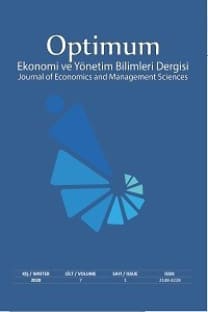Kurumsal İktisatta Açılan Yeni Bir Pencere: Douglass C. North Perspektifinden Kurumların Değerlendirilmesi
Bu çalışmanın amacı, ekonomik ve kurumsal değişimi değerlendirirken “cliometrics” (kantitatif yöntemlerin uygulanması yoluyla tarih analizi yöntemi) alanda yaptığı öncü çalışmaları ve kurumsal iktisat alanına sağladığı katkılarından dolayı 1993 yılında Nobel Ekonomi Ödülü’ ne layık görülen Douglass C. North’un kurumlar hakkındaki düşüncelerini açıklamaktır. Çalışmada, Yeni Kurumsal İktisata farklı bir bakış açısı getiren Douglass Cecil North’un perspektifinden kural ve kurum olgusu, kurumsal yapıya bağlı olarak değişen ve ekonomik performansı etkileyen işlem maliyetleri ve mülkiyet hakları konusu ile kurumsal değişimin nedenleri ve kurumsal değişimin ekonomik performans üzerindeki etkileri incelenecektir.
Anahtar Kelimeler:
Kurum, Ekonomik Büyüme, İşlem Maliyetleri, Mülkiyet Hakları
A New Window Opened at Institutional Economy: Evaluation of the Institutions in the Douglass C. North Perspective
The aim of this study is to explain the judgments on the institutions of Douglass C. North, whose was awarded the Nobel Prize in 1993 for his pioneering studies in the field of "cliometrics" (the method of historical analysis through the application of quantitative methods) field while evaluating the economic and the institutional change and for his contributions to the field of the institutional economics. In the study, the concept of rules and institutions, transaction costs and property rights that change depending on the institutional structure and affect economic performance, the reasons of the institutional change and the effects of the institutional change on the economic performance will be examined with the perspective of Douglass Cecil North, who presents a different point of view to New Institutional Economics.
Keywords:
Institution, Economic Growth, Transaction Costs, Property Rights,
___
- North, D. C. (1989), “Final Remarks Institutional Change and Economic History”, Journal of Institutional and Theoretical Economics, 145(1): 238-245.
- Steele, C. N. ( 1995), “Discovery, Transaction Costs, and Growth: Essay on Douglass C. North's Institutions, Institutional Change, and Economic Performance”, Advances in Austrian Economics, 2: 447-459.
- North, D. C. (1992), Transaction Costs, Instıtutıons, and Economic Performance, California: An International Center for Economic Growth Publication.
- North, D. C. (1993a), “The New Institutional Economics and Development”, http://econpapers.repec.org/RePEc:wpa:wuwpeh:9309002.
- Allen, D. W. (1999), Transaction Costs, Encyclopedia of Law and Economics, http://encyclo.findlaw.com/tablebib.html.
- North, D. C. (1994a), “Institutional Change: A Framework Of Analysis”, http://econpapers.repec.org/RePEc:wpa:wuwpeh:9412001.
- North, D. C. (1994b), “Economic Performance Through Time”, The American Economic Review, 84 (3): 359-368.
- North, D. C. (2002), Kurumlar, Kurumsal Değişim ve Ekonomik Performans., (Çev. Gül Çağalı Güven), İstanbul: Sabancı Üniversitesi Yayınları.
- North, D. C. (2005), “Institutions and the Process of Economic Change”, Management International, 9(3): 1-7.
- Pejovich, S. (1998), Toward a Theory of theEffects of theInteractıon of Formal and Informal Instıtutıons on Socıal Stabılıty and Economıc Development, Germany: University of Potsdam.
- Hira, A. & Hira, R. (2000), “The New Institutionalism: Contradictory Notions of Change”, American Journal of Economics and Sociology, 59(2): 267–282.
- Richter, R. (2005), “The New Institutional Economics: its Start, its Meaning, its Prospects”, European Business Organization Law Review, 6(2). 161–200.
- Rossiaud, S. & Locatelli C. (2010), “Institutional Economics”, Polinares Working Paper N. 12, September.
- Libecap, G. D. (1992), Douglass C. North, (Ed. W. J. Samules), New Horizons in Economic Thought: Appraisals of Leading Economists, London: Edward Edgar.
- Yeager, T. J. (1997), “The New Institutional Economics and its Relevance to Social Economics”, Forum for Social Economics, 27(1): 1–17.
- Williamson, O. (2000), “The New Institutional Economics : Taking Stock, Looking Ahead”, Journal of Economic Literature, 38: 595–613.
- Bednar, J. & Page, S. E. (2006), “Culture, Institutional Performance, and Path Dependence”, eScholaship University of California. 1–35.
- Dumludağ, D. (2014). Kurumlar, Kurumsal Değişim ve Ekonomik Kalkınma. Kalkınmada Yeni Yaklaşımlar (ss. 15-37). (Ed. Devim Dumludağ ve Ahmet Faruk Aysan). Ankara: İmge Kitabevi.
- Eggertson, T. (1990), Economic Behavior and İnstitutions, United Kingdom: Cambridge University Press.
- Fukuyama, F. (2005), Devlet İnşası: 21.Yüzyılda Dünya Düzeni ve Yönetişim, İstanbul: Remzi Kitabevi.
- Gagliardi, F. (2008), “Institutions and Economic Change: A Critical Survey of the New Institutional Approaches and Empirical Evidence”, Journal of Socio-Economics, 37(1): 416–443.
- North, D. C. (1993b), “Institutions and Credible Commitment”, Journal of Institutional and Theoretical Economics, 149(1): 11-23.
- Kama, Ö. (2011), “Yeni Kurumsal İktisat Okulunun Temelleri”, Gazi Üniversitesi İktisadi ve İdari Bilimler Fakültesi Dergisi, 13(2): 183-204.
- Karaman, K. K. (2013), “Law, Politics and Long Term Economic Development”, (212): 29–48.
- Mantzavinos, C., North, D. C. & Shariq, S. (2004), “Learning, Institutions, and Economic Performance”, Perspectives on Politics, 2(1): 75–84.
- Mendelski, M. (2006), The Application of Douglass North’s Approach to Institutional Change in Transition Economies, Donetsk National Technical University Series “Economics”, Donetsk, 84-91.
- North, D. C. & Thomas R. P. (1973), The Rise of the Western World: A New Economic History. United Kingdom: Cambridge University Press.
- North, D. C. (1984), “Transaction Costs, Institutions, and Economic History”, Journal of Institutional and Theoretical Economics, 140(1): 7-17.
- North, D. C. (1986), “The New Institutional Economics”, Journal of Institutional and Theoretical Economics, 142(1): 230-237.
- Yayın Aralığı: Yılda 2 Sayı
- Başlangıç: 2014
- Yayıncı: -
Sayıdaki Diğer Makaleler
Kamu Hastanelerinde Analitik Ağ Süreci Yöntemi ile Finans Yöneticisi Seçimi
Nesrin AKÇA, Seda SÖNMEZ, Şeyda GÜR, Ali YILMAZ, Tamer EREN
Mülkiyet Yoğunlaşmasının Sermaye Yapısı Üzerindeki Etkisi: Türk Bankacılık Sektörü Örneği
Kitle Fonlaması Finansman Yöntemi: Türkiye’de Sistemin Geliştirilmesine Yönelik Öneriler
Mehmet Kemalettin ÇONKAR, Muhammet Fatih CANBAZ
Türkiye’de Kamu Kesimi Kaynak Tahsisinde Etkinliğin Sağlanması Amacıyla Mali Alan Oluşturma Çabaları
Mustafa Alpin GÜLŞEN, Uğur ÇİÇEK
Ortadoğu Ülkelerinde Ticaret Hacmi ve Terör İlişkisi
Büşra TOSUNOĞLU, Selim CENGİZ, Zafer ANADOLU
Türkiye’de İslami ve Geleneksel Banka Döviz Mevduatlarının Getirileri Arasındaki İlişki
